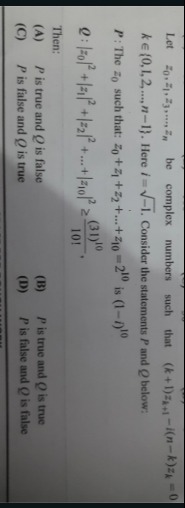Question
Question: Let $\bar{z_0},\bar{z_1},\bar{z_3},...,\bar{z_n}$ be complex numbers such that $(k+1)\bar{z}_{k+1}-i...
Let z0ˉ,z1ˉ,z3ˉ,...,znˉ be complex numbers such that (k+1)zˉk+1−i(n−k)zkˉ=0 kϵ{0,1,2,...,n−1}. Here i=−1. Consider the statements P and Q below:

P is true and Q is false
P is true and Q is true
P is false and Q is true
P is false and Q is false
(C)
Solution
The recurrence relation is given by (k+1)zˉk+1−i(n−k)zkˉ=0 for k∈{0,1,...,n−1}. For n=10, we have (k+1)zˉk+1−i(10−k)zkˉ=0 for k∈{0,1,...,9}. Taking the conjugate of this equation, we get (k+1)zk+1−i(10−k)zkˉ=0. (k+1)zk+1−(−i)(10−k)zk=0. (k+1)zk+1+i(10−k)zk=0. zk+1=k+1−i(10−k)zk for k=0,1,...,9.
We can express zk in terms of z0 by iterating this recurrence: z1=1−i(10−0)z0=−10iz0=(110)(−i)1z0. z2=2−i(10−1)z1=2−9i(−10iz0)=290i2z0=−45z0=(210)(−i)2z0. z3=3−i(10−2)z2=3−8i(−45z0)=120iz0=(310)(−i)3z0. In general, we can show by induction that zk=(k10)(−i)kz0 for k=0,1,...,10. For k=0, z0=(010)(−i)0z0=1⋅1⋅z0=z0. Assuming zk=(k10)(−i)kz0 holds for some k∈{0,1,...,9}, zk+1=k+1−i(10−k)zk=k+1−i(10−k)(k10)(−i)kz0=k+1−i(10−k)k!(10−k)!10!(−i)kz0 zk+1=(k+1)k!(10−k−1)!10!(−i)k+1z0=(k+1)!(10−(k+1))!10!(−i)k+1z0=(k+110)(−i)k+1z0. So the formula zk=(k10)(−i)kz0 is correct for k=0,1,...,10.
Statement P: The z0 such that z0+z1+z2+...+z10=210 is (1−i)10. The sum is ∑k=010zk=∑k=010(k10)(−i)kz0=z0∑k=010(k10)(−i)k. By the binomial theorem, ∑k=010(k10)(−i)k=(1+(−i))10=(1−i)10. So, the sum is z0(1−i)10. We are given that the sum is 210. z0(1−i)10=210. z0=(1−i)10210=(1−i2)10. 1−i2=(1−i)(1+i)2(1+i)=1−i22(1+i)=1+12(1+i)=22(1+i)=1+i. So, z0=(1+i)10. Statement P says that z0=(1−i)10. Since (1+i)10=(1−i)10 (e.g., ∣1+i∣10=(2)10=32, ∣1−i∣10=(2)10=32, but arg((1+i)10)=104π=25π and arg((1−i)10)=10(−4π)=−25π, which are different modulo 2π), statement P is false.
Statement Q: ∣z0∣2+∣z1∣2+∣z2∣2+...+∣z10∣2≥10!(31)10. We need to evaluate this for the specific zk sequence defined by the sum in statement P. For this sequence, z0=(1+i)10. ∣z0∣=∣(1+i)10∣=∣1+i∣10=(12+12)10=(2)10=25=32. ∣z0∣2=322=1024=210.
We have ∣zk∣=(k10)(−i)kz0=(k10)∣−i∣k∣z0∣=(k10)(1)k∣z0∣=(k10)∣z0∣. So, ∣zk∣2=((k10))2∣z0∣2. The sum of squared magnitudes is ∑k=010∣zk∣2=∑k=010((k10))2∣z0∣2=∣z0∣2∑k=010((k10))2. Using the identity ∑k=0n(kn)2=(n2n), for n=10, we have ∑k=010(k10)2=(1020). The sum of squared magnitudes is ∣z0∣2(1020). Substituting ∣z0∣2=210, the sum is 210(1020).
Statement Q is 210(1020)≥10!(31)10. 21010!10!20!≥10!(31)10. Multiply by 10!: 21010!20!≥(31)10. 10!20!=20×19×18×17×16×15×14×13×12×11. The inequality is 210×(20×19×...×11)≥(31)10. (2×20)×(2×19)×...×(2×11) is not correct. The inequality is 210×(20×19×...×11)≥3110. Let's rewrite the product on the left side: 20×19×...×11=∏j=1120j. We are comparing 210∏j=1120j with 3110. Let's compare the terms: 20>31/2=15.5 19>15.5 18>15.5 17>15.5 16>15.5 15<15.5 14<15.5 ... 11<15.5 Let's rewrite the product 20×19×...×11 as (15.5+4.5)(15.5+3.5)...(15.5+0.5)(15.5−0.5)...(15.5−4.5). The geometric mean of the terms 11,12,...,20 is 1011×12×...×20. This is greater than the arithmetic mean 1011+...+20=10155=15.5. So, 1011×12×...×20>15.5. ∏j=1120j>(15.5)10=(31/2)10=2103110. Multiplying by 210, we get 210∏j=1120j>3110. So, 21010!20!>3110. This means 21010!10!20!>10!3110. The inequality in statement Q is 210(1020)≥10!(31)10. Since we found 210(1020)>10!(31)10, the inequality holds. Statement Q is true.
Statement P is false and statement Q is true.
